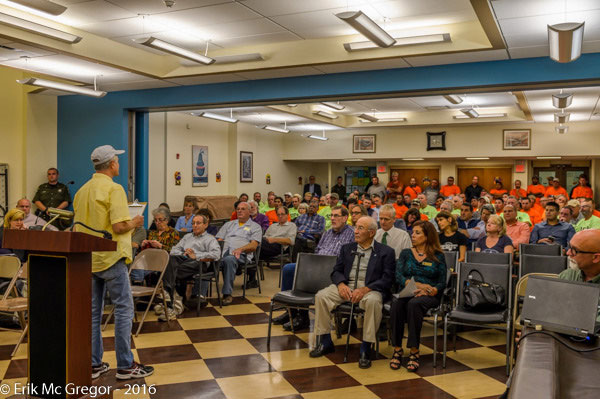The recent revelation that actors were paid to show up at New Orleans city council meetings to play the part of supporters of a proposed power plant reminds me of an informal poll that my husband and I conducted at a large cast party for one of our theater companies in 2004.
Knowing that the vast majority of professional actors make way less than poverty wages plying their craft, we posited the following to the company: “What if you were to be offered a full-time acting gig working 40 hours a week, with occasional evening and weekend work, and you had no producer, no director and no stage manager to answer to, could wear whatever wardrobe you wanted, had excellent health and vacation benefits and an employer-matched retirement plan, no lines to memorize — only improv — and got paid $40,000 a year plus an end-of-year bonus of $5,000?”
We added these details: “All you have to do is report twice a month about what you learned during your improvisation sessions, which involve infiltrating a group that’s harming your employer’s interests. Otherwise, you’re totally on your own. You may not tell a single person, including your nearest and dearest, anything about your employer or the nature of your work; that has to be part of your role. As long as you do a good job and are utterly discreet, this job is guaranteed to be yours for five years, with the opportunity to extend at the end of that term, at the employer’s discretion. Would you take it?”
Every single actor in the room unhesitatingly replied “yes.” All agreed this was a job too good to pass up. Some assumed we were actually recruiting (we were not; this was all hypothetical, but this would not be revealed until later) and asked if we would help them get the gig. Seven minutes of excited conversation ensued before one actor raised a question about who the employer was or what kind of group was being infiltrated.
Dodging the question, we countered, “Would it matter?” Several people said it wouldn’t matter to them at all; the job benefits and security were simply too good to pass up, given the precarious nature of their profession. Another person then asked if they’d be free to take other acting gigs in their off-hours. I told them yes, as long as it would not interfere with their primary job.
At that point, everyone wanted to know more details. The actor who’d asked about the employer and the infiltrated group reiterated her question. She began challenging the others to really ponder whether they’d take the gig if the employer were, say, the US military, the CIA or a maker of ammunitions that was at the time pummeling the people of Iraq and destroying their future.
The Ethics of Infiltration
Others chimed in. What if the employer were Enron, or JP Morgan, or Comcast, or some organization fighting LGBTQ rights or same-sex marriage? What if it were a diocese seeking to cover up information about a priest who had molested children? What if the employer were the Republican Party, or a group opposed to reproductive rights? ExxonMobil? Walmart? An organization that works to shut down performing arts centers in favor of sports arenas? The KKK? The cacophony grew as more possibilities were thrown out, and the actors became increasingly alarmed at what they might have committed to.
Some of them asked if they could change their responses or add qualifiers. I asked everyone to take a deep breath and consider the question a little more deeply. We went around the circle again.
This time, the first few respondents said they’d reconsidered. They could infiltrate a right-wing group, an anti-choice group or a military contractor’s offices but not an environmental group, a pro-choice group or a group of peace activists.
We breathed a sigh of relief. This was more along the lines of what we’d hoped and expected when we’d thrown out the question in the first place.
These respondents, however, got some pushback. One woman, an actor in her mid-50s who had lived on the edge of destitution since we’d first met her and her husband (a writer) two decades earlier, put it most bluntly: “The obvious situation is that none of your so-called ‘good guys’ could afford to pay us that salary plus benefits. The only people who could afford them would, of course, be either a governmental agency or some schmucky corporation. If we’re honest with ourselves, we have to admit we would sell out our principles for health benefits and a roof over our heads. For one thing, I’d be surprised if Social Security is still around when I’m 65 … and we haven’t together earned enough money in our lifetime to amount to a monthly check sufficient to pay our rent anyway. I’d have no choice but to take the gig, no matter who’s paying me.”
She’d obviously struck a nerve, because a few others agreed with her that they’d do it despite misgivings, because they had no option, financially.
At this point, the conversation veered and resulted in a mutual agreement that no one would judge any of the others for the choice they made. Some of the actors with the most precarious financial situations decided that they wouldn’t take the job at any cost. Some now said that even if they agreed with the employer’s philosophies and politics, they wouldn’t feel right taking such a suspect job.
Actors Aren’t the Only Ones Susceptible
Since then, it has never surprised me to hear of a corporation’s or government entity’s success in hiring actors to infiltrate anti-corporate groups or to play fictional parts in supporting government or industrial projects.
These need not be professional actors, either. Union members from various trades are regularly hired to show up at fossil fuel corporations’ dog-and-pony shows and proclaim their support for pro-fossil-fuel “job creation,” always citing preposterous claims of thousands of such jobs, which never materialize.
Often these union members are recruited to come in from distant counties or neighboring states. They show up at the Federal Energy Regulatory Commission public hearings or similarly phony events put on by a state’s Department of Environmental Conservation, Department of Environmental Protection, Natural Resources Protection Agency or some other deliberately misnamed office, where the destructive project had been approved long before the public would hear the first word about it.
And almost always they’re wearing orange shirts — which to seasoned observers have become clear symbols of industry collusion, more reliable than any red flag. People wearing these shirts have been seen all around New York State at hearings about fracked-gas pipelines, compressor stations and power plants; frack-waste dumping and fossil-fuel storage.

In Wawayanda, New York, grassroots group Protect Orange County has worked for years to halt construction — and now operation — of an enormous 650-megawatt electrical generating power plant run on fracked gas and diesel fuel, which is sickening people who live in the vicinity, many of whom are people of color. Protect Orange County chair Pramilla Malick attended all the public events relating to the CPV Valley Energy plant, which is owned by a group of international investors. “At one of the hearings,” said Malick, “a person wearing an orange union shirt told me they were paid two hours of overtime to be there but were upset because when the two hours were up, the person they were supposed to applaud for hadn’t spoken yet. So, most of them cleared out at the end of the two hours.”
Dennis Higgins, an activist with several groups in New York State’s Leatherstocking region, reports similarly about hearings on three pipelines. “Labor people were bused in to Department of Environmental Conservation or Federal Energy Regulatory Commission hearings on the Constitution, NED and Dominion ‘New Market’ Pipelines,” he said. “There might be 50 or 100 guys in orange shirts at any given hearing. They were often rowdy, and occasionally troopers would escort one out. They sometimes had trouble reading their statements, giving the impression those comments had been handed to them a few minutes earlier. We were told that the local labor members had been given a t-shirt and free dinner to attend hearings.”
Higgins remembers one time when labor and art collided in an unsettling sign of the times. “At the NED hearing in Schoharie, they drove their local labor neon truck back and forth,” he said, “playing Woody Guthrie loud. That, I thought, was the cruelest blow. Woody defended labor his whole life. And here you have labor joined with big fossil fuel corporations in an effort to take land from private citizens, and to pollute the land; and they were treating Woody’s songs as their anthem.”
In a country where the arts have never been well supported and unions have been under vicious assault since the Reagan era, it should come as no surprise that the people who work in these professions are especially vulnerable to exploitation by the rich and powerful.
If we’re to keep from seeing such dramas play out in future, we would be wise to shore up both the arts and labor, critical sectors of any civilized society, and stay alert to the likelihood of coercion in any field of endeavor.
Join us in defending the truth before it’s too late
The future of independent journalism is uncertain, and the consequences of losing it are too grave to ignore. To ensure Truthout remains safe, strong, and free, we need to raise $46,000 in the next 7 days. Every dollar raised goes directly toward the costs of producing news you can trust.
Please give what you can — because by supporting us with a tax-deductible donation, you’re not just preserving a source of news, you’re helping to safeguard what’s left of our democracy.
